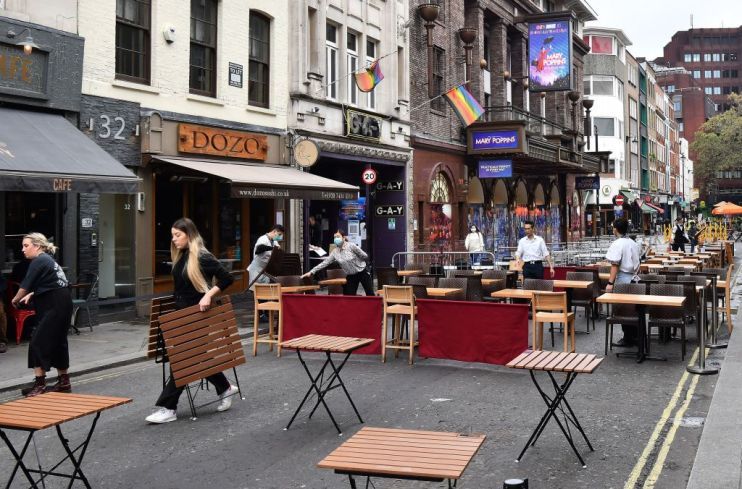Roadmap: Hospitality industry faces financial ruin as sector remains shut until April

The hospitality industry has reacted with fury as the Prime Minister plans to allow pubs and restaurants to serve outdoors only and not until 12 April.
Currently, only 40 per cent of businesses in hospitality have outdoor spaces, meaning most will still face restrictions after April.
In response to today’s announcement, UK Hospitality Chief Kate Nicholls has warned of the impact enforcing outdoor table service will have, including forcing many businesses to trade below ‘sustainable levels’.
“The Chancellor has just nine days to save thousands of businesses and hundreds of thousands of jobs that simply will not be there without a substantial package of compensation,” she said.
To add further pressure, government analysis predicts that two-thirds of businesses will run out of cash before May.
Kate Nicholls also brought attention to nightclubs which have to many been forgotten victims of the pandemic.
“The night-time economy has been left in limbo once again. While hope is now in sight, nightclub venues will have been closed for 15 months,” she said, adding that “the loss of our nightclubs would be a huge cultural blow as well as a significant economic one.”
The night time economy employs around 1m workers, and currently, around forty businesses a week are being lost.
Hospitality
Hospitality represents ten per cent of UK employment, six per cent of businesses, and five per cent of Britain’s GDP.
Additionally, the industry is the third largest private-sector employer in the UK, double the size of financial services and bigger than automotive, pharmaceuticals and aerospace combined.
With hospitality creating £130bn in economic activity and generating £39bn of tax for the Chancellor of the Exchequer, leaders fell it is incumbent on Rishi Sunak to recognise their contribution.
Among the calls for financial intervention include an extension to the furlough scheme, the cut on VAT, and business rate holidays.
The Food and Drink Federation and Greene King have also conveyed their frustrations, indicating their concern for how businesses could recover.
Chief Executive of the FDF, Ian Wright, has said that a return to normal is now increasingly a long way off and pointed out his disappointment at businesses’ input not being taken into account.
“A return to ‘business as usual’ seems an awful long way off. As such, it is only correct that the Chancellor outlines significant extensions to the furlough and credit insurance schemes as part of his Budget announcement next week,” Wright said.
“The food and drink industry is the UK’s largest manufacturing sector. It will therefore be key to the country’s economic recovery, with a footprint in every region. Now is the time for the government to provide additional support to ensure those businesses most at risk can play their part in putting the country back on its feet,” he added.
Budget
Meanwhile, Greene King’s CEO Nick Mackenzie suggested the upcoming government’s Budget needs to take account of the further blow to the sector.
“Next week’s Budget needs to bring positive news as we continue to burn tens of millions of pounds in cash every month,” Mackenzie noted.
“Pubs and hospitality can be part of the solution when it comes to safe and responsible socialising, where people can meet in Covid secure environments rather than behind closed doors in each other’s homes,” he stressed.
Also mentioned in the roadmap out of lockdown were the planned relaxing of rules for mixing, live events and staycations. The government hopes to ditch outdoor limits on social distancing entirely by 17 May.
Entertainment venues – such as cinemas and play areas – will be allowed to reopen, while hotels, B&Bs, and indoor adult sports groups will resume. It’s also the earliest date that non-essential international travel can resume.
The government is also preparing to allow live sport and music. Larger performances with 1,000 people or half-full venues, whichever is lower, will be allowed indoors.
Outdoor performances with 4,000 people or half-full venues, whichever is lower, will be allowed. For larger venues such as Wembley Stadium, as many as 10,000 people will be allowed to attend.
Staycations will also be back on the cards from mid-April when self-catered accommodation will be allowed to resume.